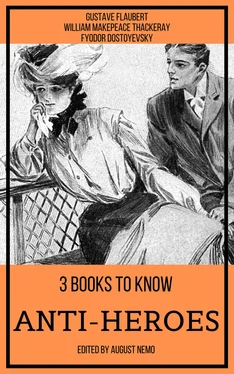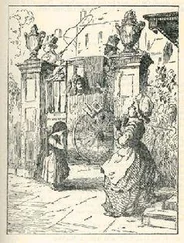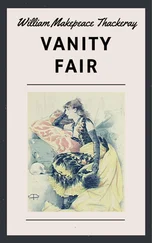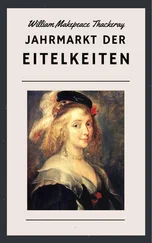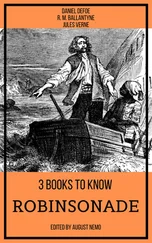‘A pretty day’s work of it you have made, Master Redmond,’ said he. ‘What! you a friend to the Bradys, and knowing your uncle to be distressed for money, try and break off a match which will bring fifteen hundred a year into the family? Quin has promised to pay off the four thousand pounds which is bothering your uncle so. He takes a girl without a penny—a girl with no more beauty than yonder bullock. Well, well, don’t look furious; let’s say she IS handsome—there’s no accounting for tastes,—a girl that has been flinging herself at the head of every man in these parts these ten years past, and MISSING them all. And you, as poor as herself, a boy of fifteen—well, sixteen, if you insist—and a boy who ought to be attached to your uncle as to your father’—
‘And so I am,’ said I.
‘And this is the return you make him for his kindness! Didn’t he harbour you in his house when you were an orphan, and hasn’t he given you rent-free your fine mansion of Barryville yonder? And now, when his affairs can be put into order, and a chance offers for his old age to be made comfortable, who flings himself in the way of him and competence?—You, of all others; the man in the world most obliged to him. It’s wicked, ungrateful, unnatural. From a lad of such spirit as you are, I expect a truer courage.’
‘I am not afraid of any man alive,’ exclaimed I (for this latter part of the Captain’s argument had rather staggered me, and I wished, of course, to turn it—as one always should when the enemy’s too strong); ‘and it’s I am the injured man, Captain Fagan. No man was ever, since the world began, treated so. Look here—look at this riband. I’ve worn it in my heart for six months. I’ve had it there all the time of the fever. Didn’t Nora take it out of her own bosom and give it me? Didn’t she kiss me when she gave it me, and call me her darling Redmond?’
‘She was PRACTISING,’ replied Mr. Fagan, with a sneer. ‘I know women, sir. Give them time, and let nobody else come to the house, and they’ll fall in love with a chimney-sweep. There was a young lady in Fermoy’—
‘A young lady in flames,’ roared I (but I used a still hotter word). ‘Mark this; come what will of it, I swear I’ll fight the man who pretends to the hand of Nora Brady. I’ll follow him, if it’s into the church, and meet him there. I’ll have his blood, or he shall have mine; and this riband shall be found dyed in it. Yes, and if I kill him, I’ll pin it on his breast, and then she may go and take back her token.’ This I said because I was very much excited at the time, and because I had not read novels and romantic plays for nothing.
‘Well,’ says Fagan after a pause, ‘if it must be, it must. For a young fellow, you are the most blood-thirsty I ever saw. Quin’s a determined fellow, too.’
‘Will you take my message to him?’ said I, quite eagerly.
‘Hush!’ said Fagan: ‘your mother may be on the look-out. Here we are, close to Barryville.’
‘Mind! not a word to my mother,’ I said; and went into the house swelling with pride and exultation to think that I should have a chance against the Englishman I hated so.
Tim, my servant, had come up from Barryville on my mother’s return from church; for the good lady was rather alarmed at my absence, and anxious for my return. But he had seen me go in to dinner, at the invitation of the sentimental lady’s-maid; and when he had had his own share of the good things in the kitchen, which was always better furnished than ours at home, had walked back again to inform his mistress where I was, and, no doubt, to tell her, in his own fashion, of all the events that had happened at Castle Brady. In spite of my precautions to secrecy, then, I half suspected that my mother knew all, from the manner in which she embraced me on my arrival, and received our guest, Captain Fagan. The poor soul looked a little anxious and flushed, and every now and then gazed very hard in the Captain’s face; but she said not a word about the quarrel, for she had a noble spirit, and would as lief have seen anyone of her kindred hanged as shirking from the field of honour. What has become of those gallant feelings nowadays? Sixty years ago a man was a MAN, in old Ireland, and the sword that was worn by his side was at the service of any gentleman’s gizzard, upon the slightest difference. But the good old times and usages are fast fading away. One scarcely every hears of a fair meeting now, and the use of those cowardly pistols, in place of the honourable and manly weapon of gentlemen, has introduced a deal of knavery into the practice of duelling, that cannot be sufficiently deplored.
When I arrived at home I felt that I was a man in earnest, and welcoming Captain Fagan to Barryville, and introducing him to my mother, in a majestic and dignified way, said the Captain must be thirsty after his walk, and called upon Tim to bring up a bottle of the yellow-sealed Bordeaux, and cakes and glasses, immediately.
Tim looked at the mistress in great wonderment: and the fact is, that six hours previous I would as soon have thought of burning the house down as calling for a bottle of claret on my own account; but I felt I was a man now, and had a right to command; and my mother felt this too, for she turned to the fellow and said, sharply, ‘Don’t you hear, you rascal, what YOUR MASTER says! Go, get the wine, and the cakes and glasses, directly.’ Then (for you may be sure she did not give Tim the keys of our little cellar) she went and got the liquor herself; and Tim brought it in, on the silver tray, in due form. My dear mother poured out the wine, and drank the Captain welcome; but I observed her hand shook very much as she performed this courteous duty, and the bottle went clink, clink, against the glass. When she had tasted her glass, she said she had a headache, and would go to bed; and so I asked her blessing, as becomes a dutiful son—(the modern BLOODS have given up the respectful ceremonies which distinguished a gentleman in my time)—and she left me and Captain Fagan to talk over our important business.
‘Indeed,’ said the Captain,’ I see now no other way out of the scrape than a meeting. The fact is, there was a talk of it at Castle Brady, after your attack upon Quin this afternoon, and he vowed that he would cut you in pieces: but the tears and supplications of Miss Honoria induced him, though very unwillingly, to relent. Now, however, matters have gone too far. No officer, bearing His Majesty’s commission, can receive a glass of wine on his nose—this claret of yours is very good, by the way, and by your leave we’ll ring for another bottle—without resenting the affront. Fight you must; and Quin is a huge strong fellow.’
‘He’ll give the better mark,’ said I. ‘I am not afraid of him.’
‘In faith,’ said the Captain,’ I believe you are not; for a lad, I never saw more game in my life.’
‘Look at that sword, sir,’ says I, pointing to an elegant silver-mounted one, in a white shagreen case, that hung on the mantelpiece, under the picture of my father, Harry Barry. ‘It was with that sword, sir, that my father pinked Mohawk O’Driscol, in Dublin, in the year 1740; with that sword, sir, he met Sir Huddlestone Fuddlestone, the Hampshire baronet, and ran him through the neck. They met on horseback, with sword and pistol, on Hounslow Heath, as I dare say you have heard tell of, and those are the pistols’ (they hung on each side of the picture) ‘which the gallant Barry used. He was quite in the wrong, having insulted Lady Fuddlestone, when in liquor, at the Brentford assembly. But, like a gentleman, he scorned to apologise, and Sir Huddlestone received a ball through his hat, before they engaged with the sword. I am Harry Barry’s son, sir, and will act as becomes my name and my quality.’
Читать дальше
